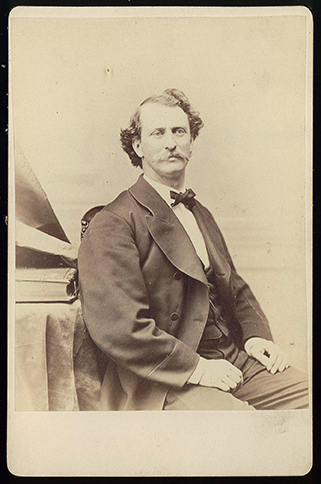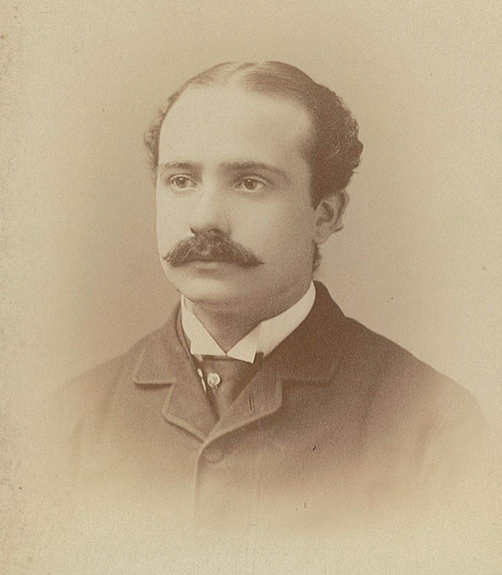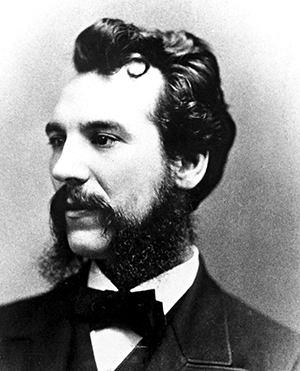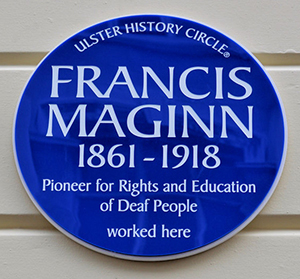‘Deaf Liberator’—the life and times of Francis Maginn, 1861–1918
Published in Features, Issue 4 (July/August 2021), Volume 29By Noel O’Connell

Above: Edward Miner Gallaudet, president of the Columbia Institution for the Instruction of the Deaf and Dumb and Blind in Washington DC from 1864 (known as Gallaudet College from 1894), the world’s only university for deaf students. Francis Maginn was a student there and became a close friend. (Gallaudet University Archive)
Francis Maginn was the foremost pioneer of the deaf community in Ireland and Britain during the late nineteenth and early twentieth centuries. No one enjoyed such prominence, status and acclaim in the deaf world of the time. From being a teacher of deaf children at the Royal School for the Deaf in Margate, London, he became a political advocate and champion of the rights of deaf people. He was a close friend of American educator Edward Miner Gallaudet, whom he met while a student at Gallaudet University, the world’s only university for deaf students. Maginn was a missionary, a man of vision and ambition, and a tireless campaigner for the rights of deaf people. He helped found the British Deaf Association, an organisation that still exists today. He also helped Wilhelmina Tredennick to set up the Adult Deaf and Dumb Mission to ‘assist the deaf and dumb find employment’ and ‘raise the standard of life and character among them, to counsel and advise them in difficulties, to protect them from injustice and wrong’ (Caul 2006, 19). He was honoured by the French government for his outstanding contribution to deaf education, having attended international congresses in France over the years. He was appointed an officer of the French Academy, which reflects the esteem in which he was held throughout Europe.
Early life
Francis Maginn, the son of a Church of Ireland rector and rural dean, was born in the village of Castletownroche, near Mallow, Co. Cork, on 21 April 1861. He was the sixth of twelve children born to Charles and Mary Maginn. His mother is said to have been a very literary person and was related to the poet Edmund Spenser. When he was five years old, Francis contracted scarlet fever and became profoundly deaf as a result. The illness was a common cause of deafness at the time. When the symptoms abated, it was discovered that he had lost most of his power of speech. He suffered memory loss and could not remember much of his early childhood. It seems that his parents struggled to cope with his affliction, given the prevalent societal attitude towards and lack of understanding of deafness in nineteenth-century Ireland. They reserved a place for him in a British school, the Asylum for Deaf and Dumb Children in Bermondsey, London—not an unusual option for middle-class Protestant families from Ireland. The school used sign language as a means of instruction and adopted a similar approach to the method used at a school for deaf children in France founded by Abbé Charles-Michel de l’Épée.
Education
Maginn was educated at Bermondsey from the age of nine. Initially he could hardly spell a word but soon began to make up lost ground. He made such excellent progress that he was appointed as pupil-teacher in another branch of the Asylum, the Royal School for the Deaf in Margate, London. By the time he was seventeen, he had trained to become a junior teacher at the school. In 1879 he told the headmaster, Richard Elliot, of his ambition to matriculate at London University. Elliot tried to persuade him to remain at the school but Maginn was not to be swayed. His strong desire to develop his education would eventually see him leave the Margate school in 1883.

Above: Francis Maginn—foremost pioneer of the deaf community in Ireland and Britain during the late nineteenth and early twentieth centuries. (Gallaudet University Archive)
In September 1880 Elliot attended one of the most controversial meetings in the history of deaf education: the second International Congress for the Education of the Deaf, which took place in Milan, Italy. The resolutions passed at the congress had a major bearing on the future education of deaf children all over the world, culminating in a storm of conflict over best practice and the different educational approaches. The most controversial issue was the two resolutions banning the use of sign language in all schools for deaf children. The contention among the hearing educators was that spoken language was superior to sign language for restoring deaf people to social life and giving them greater facility to develop language, while sign language was nothing more than a form of gesture, pantomime and mimicry. Elliot and Edward Minor Gallaudet in the United States were among the few who opposed the resolutions. They believed that sign language had an important role in the education of deaf children because it was more accessible than spoken language. When Elliot returned from Milan, Maginn learned about the resolutions on sign language and this gave him the impetus to campaign for its retention in schools for deaf children.
Gallaudet University
In 1883 Maginn returned home to Ireland to contemplate his future. From 1883 to 1884 he provided Bible classes for Protestant members of the deaf community in the library of Christ Church schoolroom on South Main Street, Cork. In 1884 a public meeting was held at South Mall Hall, presided over by the lord bishop of the diocese and attended by a large number of deaf people, to discuss Maginn’s proposal to establish a branch of the Deaf and Dumb Christian Association, a Protestant body, in Cork. Maginn was included among the new members of the committee announced that evening.
It was during this time that he received an offer of a place in what later became known as Gallaudet University in Washington DC, the only higher-education institution for deaf students in the world at the time. It was named after Thomas Hopkins Gallaudet, a clergyman who had founded the first American school for deaf children in Hartford, Connecticut. His son, Edward, was president of the college from 1864 to 1910. While he was a student at Gallaudet University, Maginn learned American Sign Language (ASL) and became impressed by the self-confidence shown by American deaf people. This was an important time in his life, as he became interested in the idea of forming an association for deaf people similar to the ones established in the United States. He became friends with Edward M. Gallaudet, who was impressed by his intelligence and communication ability. Owing to his father’s illness, however, Maginn was unable to complete his studies, returning to Ireland before his father died in 1887. In 1901 he was awarded an honorary degree of Bachelor of Divinity by the college.
The mission
It was after his father’s death that Maginn began missionary work for deaf people in Ireland. In 1888 he took up a new post at the Mission Hall in a town house in Belfast under the Church of Ireland Management Committee. The Mission Hall provided services to both Protestant and Catholic deaf people. The society was originally founded in 1873 by Wilhelmina Tredennick from Ballyshannon, Co. Donegal, and was reorganised in 1885 as the Missions to the Adult Deaf and Dumb of Ireland (renamed the Ulster Institute for the Deaf in the late 1950s). Between 1888 and 1918 Maginn played a huge role in the mission, providing organised community support services for both Protestant and Catholic deaf people throughout Ireland. He was assigned to help deaf people find employment regardless of their religious affiliation. The mission provided residential hostel accommodation for about 30 deaf people. As part of his role, Maginn travelled the length and breadth of the country to visit deaf people, including those living in Cork, the city of his birth. He also helped secure employment for deaf people in the Belfast shipping area. In those days, deaf people functioned more as a sign-language community with a unique culture than as members of a particular religious community. They lived in relative obscurity, often shielded from the religious and political differences that permeated mainstream society.
Alexander Graham Bell and ‘oralism’

Above: Alexander Graham Bell—argued that sign language should be eradicated and that the intermarriage of deaf couples and their socialisation should be discouraged. (Coady Slaunwhite, Parks Canada)
Maginn’s vision for missionary life was best exemplified by a desire to found an association for deaf people in Britain and Ireland. While in London, he expressed concern about the effect of the Milan Congress on the future education of deaf children. He made his views known in a submission to the Royal Commission but was never invited to present his case against the Milan Congress resolutions. Instead, Alexander Graham Bell was chosen to give a presentation in which he argued the case in favour of oralism, an education ideology promoting the exclusive use of speech and spoken language. In his paper ‘Memoir Upon the Formation of a Deaf Variety of the Human Race’, Bell argued that sign language should be eradicated and that the intermarriage of deaf couples and their socialisation should be discouraged. He feared that the human race would be ‘contaminated’ by the propagation of deaf marriages. The Royal Commission Report on Deaf Education (1889) was highly influential in introducing oralism in Britain and Ireland.
Concerned about these developments, Maginn organised a national conference to discuss the recommendations of the Royal Commission, resulting in the foundation of the British Deaf and Dumb Association (now known as the British Deaf Association) in January 1890. He proposed that membership should be open only to deaf people, but when he encountered resistance from delegates who wanted hearing people on board he decided against putting forward the motion. The new association amended its constitution to allow hearing people to become ordinary members. This eventually led to the appointment of a hearing president, with Maginn assigned the role of vice-president, an honorary position with no real power. Sensing the paternalism shown by the hearing leaders controlling the organisation, Maginn gradually withdrew from its activities. He subsequently returned to Ireland to devote time to missionary work in Belfast.
Maginn worked in close collaboration with the Ulster Institute for the Deaf and Dumb and Blind on the Lisburn Road, Belfast, to secure employment for deaf school-leavers. Edward Gallaudet visited him there on a number of occasions, which shows the respect in which Maginn was held by his American counterparts. In 1899 he married Agnes McCleane, a hearing woman from Dublin who brought great energy to fund-raising for the mission work for deaf people. They did not have any children. Maginn was tireless in his efforts to find employment for deaf people. On 20 December 1913 he was honoured by the French government in recognition of his outstanding work. He was appointed an officer of the French Academy, a reflection of the great respect in which he was held throughout Europe. He received much inspiration from the French educators of deaf people.
Maginn’s last days were spent in the mission work in Belfast, helping deaf people to find jobs and secure social housing. In 1918 he met his demise under tragic circumstances. He had been suffering from poor health for some time, which was exacerbated by an accidental injury sustained at a gala evening attended by a large crowd of deaf people. At the end of the night, when most attendees had gone home, a fight broke out between two deaf men in the mission recreation room. In his attempt to separate those involved in the altercation, Maginn received a heavy punch to the chest. He died of his injuries in December that year. He was 57 years old.
 Blue plaque
Blue plaque
In April 2011 a blue plaque was unveiled at Wilton House, Belfast, to mark the 150th anniversary of Maginn’s birth. The event recognised his contribution to the lives of deaf people in Ireland and Britain. A commemorative service was held at his graveside, with the order of service given by Canon Will Murphy. The occasion was marked by tributes and Bible readings followed by grace, and a wreath was placed on his grave. To this day, Francis Maginn remains one of the most talked-about deaf liberators in Ireland and Britain.
Noel O’Connell Ph.D is a deaf scholar and historian, currently on the board of the Deaf Heritage Centre, Dublin.
FURTHER READING
B. Caul, Francis Maginn: his life and times (Belfast, 2006).
















